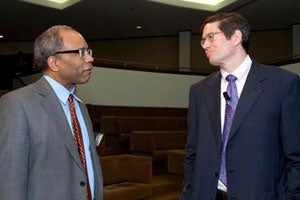“The conventional wisdom is that the Supreme Court is an heroic defender of the rights of racial minorities … I want to argue to the contrary. The Supreme Court has been a foe, rather than a friend to racial minorities in general, and African Americans specifically.”
That was the opening message delivered by Harvard Law School Professor Michael Klarman in a lecture titled “The Supreme Court and Race” at the American Academy of Arts & Sciences on March 10.
Listen to an audio recording of Klarman’s speech here.
“It’s really Brown v. Board of Education in 1954, and it’s immediate progeny that are responsible for this romantic image we have of the Supreme Court as a savior of the interests of African Americans,” said Klarman. More accurately, he argued, the Court’s record on racial equality has often been one of obstruction, complacency and foot-dragging, shaped by contemporaneous politics. In a review of the Court’s major cases on issues of racial equality, Klarman made the argument that the Court has often ruled in favor of equal rights only after political winds have long-since shifted in that direction.
“When the Court strikes down affirmative action programs, it is unelected justices striking down the democratically chosen policies of state and local governments, and they are doing it on a thin constitutional basis,” said Klarman. “The text of the Fourteenth Amendment doesn’t say anything about government color blindness and the original understanding of the Fourteenth Amendment, which these justices ordinarily profess a commitment to abiding by, does not mandate color blindness. The people who wrote the Fourteenth Amendment and their constituents were actually, perhaps ironically, too racist to support a complete ban on government racial classification. … It is impossible, I would submit to you, to derive from the Fourteenth Amendment, a mandate for color blindness.”
Lawrence D. Bobo, the W.E.B. Du Bois Professor of Social Sciences at Harvard University, gave the welcoming remarks (Listen to audio). Klarman was introduced by Randall Kennedy, the Michael R. Klein Professor of Law. (Listen to audio).
The event was sponsored by the American Academy of Arts & Sciences in collaboration with W.E.B. Du Bois Institute for African and African American Research at Harvard University and Museum of African American History.
Klarman was inducted into the AAAS last October. He was one of 210 new members, including David Berg Professor of Law Mark Roe ’75, selected for “pre-eminent contributions to their disciplines and to society at large.”
Klarman joined the Harvard Law School faculty in 2008. An expert in constitutional law and history with a particular focus on race, he currently teaches criminal law, constitutional law, constitutional theory, and constitutional history. He is the Kirkland & Ellis Professor of Law.
Klarman is the author of several books and over 30 articles, including “From Jim Crow to Civil Rights: The Supreme Court and the Struggle for Racial Equality,” which won the Bancroft Prize in 2005, widely considered to be the most prestigious award in American history writing. His most recent book is “Unfinished Business: Racial Equality in American History,” which was published in 2007.
Klarman’s scholarly work and teaching has garnered him several awards, including the first Roger and Madeleine Traynor Faculty Achievement Award for Excellence in Legal Scholarship given by Virginia Law, the University of Virginia Harrison Achievement Award, the State Council of Higher Education Faculty Award, and the All-University Teaching Award, one of the University’s highest honors for excellence in teaching, research, and service.
